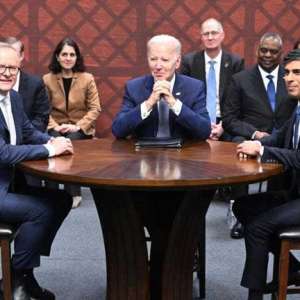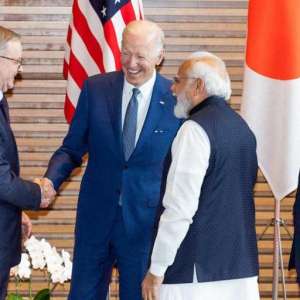Sydney Morning Herald
Australia’s no longer a small player in global politics, so we must be ready for hard choices
Story by George Brandis • 3h ago - 17-4-2023
Next month, Anthony Albanese welcomes the President of the United States Joe Biden, Indian Prime Minister Narendra Modi and Japanese PM Fumio Kishida for the first leaders-level meeting of the Quad hosted by Australia.
He will also attend the G7 meeting in Hiroshima to which Australia has been invited – along with fellow ad hoc members India and South Korea. Albanese has also been invited to the critical NATO summit on Ukraine in July; it would be a serious mistake not to attend.
Those international engagements, together with last month’s announcement on the AUKUS acquisition program and the coming release of the Defence Strategic Review, all focus attention on the challenging strategic position which Australia now faces as the democracies come to terms with the belligerence of the world’s two great authoritarian states, Russia and China.
Some Western politicians and commentators refer to the current strategic situation as a “new Cold War”. Yet the comparison is too glib, and in many important ways inaccurate.
The Soviet Union, unlike contemporary China, was not an economic superpower. After the Sino-Soviet split of 1960, the two communist powers were mutually hostile. The heart of Cold War competition was Europe, fractured by what Churchill famously called the Iron Curtain. The conflict was cast in explicitly ideological rather than territorial terms – as a struggle between systems and ideas.
The better 20th-century comparison (although there are important differences) is with the 1930s, when authoritarian states, often asserting baseless historical claims, acted in defiance of the emergent system of collective security represented by the League of Nations: Japan in Manchuria, Italy in Abyssinia, Germany across Europe.
The war that followed was the only time that Australia has felt existentially threatened. While we now know from archival research that Japanese policy was not to invade Australia but to isolate it, that was not how it seemed at the time – particularly to those who lived in northern Australia.
There are few still alive who remember the Pacific War; every generation since, from the Baby Boomers onward, has grown up in a sense of relative security. Even Vietnam, the most serious war in our region which many Australians remember, was not accompanied by widespread fear of communist invasion if South Vietnam fell.
Australians’ sense of security has been buttressed, in particular, by two assumptions. First is our belief that we live in a peaceful corner of the world, sequestered from great power conflict historically centred on the Euro-Atlantic. Memories of the Pacific War passed into history with earlier generations. Vietnam divided us but didn’t threaten us. The south-west Pacific, as its name suggests, was a peaceful ocean, about as far away from the world’s trouble spots as it is possible to get.
Allied to our sense that we live in a peaceful part of the world, deep in the national psyche has been the belief that we are a small nation; if not irrelevant to global affairs, then at least of marginal significance to them: a kind of subtropical Scandinavia.
Australia’s no longer a small player in global politics, so we must be ready for hard choices
Story by George Brandis • 3h ago - 17-4-2023
Next month, Anthony Albanese welcomes the President of the United States Joe Biden, Indian Prime Minister Narendra Modi and Japanese PM Fumio Kishida for the first leaders-level meeting of the Quad hosted by Australia.
He will also attend the G7 meeting in Hiroshima to which Australia has been invited – along with fellow ad hoc members India and South Korea. Albanese has also been invited to the critical NATO summit on Ukraine in July; it would be a serious mistake not to attend.
Those international engagements, together with last month’s announcement on the AUKUS acquisition program and the coming release of the Defence Strategic Review, all focus attention on the challenging strategic position which Australia now faces as the democracies come to terms with the belligerence of the world’s two great authoritarian states, Russia and China.
Some Western politicians and commentators refer to the current strategic situation as a “new Cold War”. Yet the comparison is too glib, and in many important ways inaccurate.
The Soviet Union, unlike contemporary China, was not an economic superpower. After the Sino-Soviet split of 1960, the two communist powers were mutually hostile. The heart of Cold War competition was Europe, fractured by what Churchill famously called the Iron Curtain. The conflict was cast in explicitly ideological rather than territorial terms – as a struggle between systems and ideas.
The better 20th-century comparison (although there are important differences) is with the 1930s, when authoritarian states, often asserting baseless historical claims, acted in defiance of the emergent system of collective security represented by the League of Nations: Japan in Manchuria, Italy in Abyssinia, Germany across Europe.
The war that followed was the only time that Australia has felt existentially threatened. While we now know from archival research that Japanese policy was not to invade Australia but to isolate it, that was not how it seemed at the time – particularly to those who lived in northern Australia.
There are few still alive who remember the Pacific War; every generation since, from the Baby Boomers onward, has grown up in a sense of relative security. Even Vietnam, the most serious war in our region which many Australians remember, was not accompanied by widespread fear of communist invasion if South Vietnam fell.
Australians’ sense of security has been buttressed, in particular, by two assumptions. First is our belief that we live in a peaceful corner of the world, sequestered from great power conflict historically centred on the Euro-Atlantic. Memories of the Pacific War passed into history with earlier generations. Vietnam divided us but didn’t threaten us. The south-west Pacific, as its name suggests, was a peaceful ocean, about as far away from the world’s trouble spots as it is possible to get.
Allied to our sense that we live in a peaceful part of the world, deep in the national psyche has been the belief that we are a small nation; if not irrelevant to global affairs, then at least of marginal significance to them: a kind of subtropical Scandinavia.
3 yr. ago



